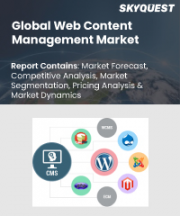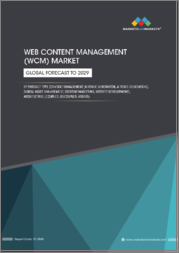
|
시장보고서
상품코드
1623967
디지털 자산 관리 시장 - 규모, 점유율, 성장 분석 : 솔루션별, 서비스별, 업무 기능별, 조직 규모별, 업계별, 지역별 산업 예측(2025-2032년)Digital Asset Management Market Size, Share, Growth Analysis, By Solution, By Services, By Business Function, By Organization Size, By Vertical, By Region - Industry Forecast 2025-2032 |
||||||
디지털 자산 관리(DAM) 세계 시장 규모는 2023년 41억 1,000만 달러로 평가되었으며, 2024년 48억 5,000만 달러에서 2032년에는 182억 3,000만 달러로 성장해 예측 기간(2025-2032년)의 CAGR은 18.0%로 성장할 전망입니다.
디지털 자산 관리(DAM) 시스템은 브랜드의 일관성과 법률 준수를 보장하면서 디지털 컨텐츠의 효과적인 관리, 전달 및 수익화를 목표로 하는 기업에 필수적입니다. 디지털 변환기의 노력에 착수하는 동안 디지털 컨텐츠의 생성과 공유가 현저하게 증가하고 있습니다. 기존의 온프레미스형에 비해 비용 효율성, 확장성, 실시간 협업 기능이 뛰어나기 때문에 클라우드 기반 시스템을 선호하는 기업이 늘어나고 있습니다. 그러나 기업은 이러한 진화하는 디지털 상황에서 경쟁력을 유지하기 위해 데이터 보안, 규정 준수 및 메타 데이터 관리와 같은 문제를 극복해야하며 고급 DAM 솔루션 지속적인 투자가 필요합니다.
목차
소개
- 조사의 목적
- 조사 범위
- 정의
조사 방법
- 정보 조달
- 2차 데이터와 1차 데이터의 방법
- 시장 규모 예측
- 시장의 전제조건과 제한
주요 요약
- 세계 시장 전망
- 공급과 수요 동향 분석
- 부문별 기회 분석
시장 역학과 전망
- 시장 개요
- 시장 규모
- 시장 역학
- 성장 촉진요인과 기회
- 억제요인과 과제
- Porter's Five Forces 분석
주요 시장 인사이트
- 중요성공요인
- 경쟁도
- 주요 투자 기회
- 시장 생태계
- 시장의 매력 지수(2024년)
- PESTEL 분석
- 거시경제지표
- 밸류체인 분석
- 가격 분석
- 기술의 진보
- 규제 상황
세계 디지털 자산 관리(DAM) 시장 규모 : 솔루션별
- 시장 개요
- 온프레미스
- 클라우드 기반
세계 디지털 자산 관리(DAM) 시장 규모 : 서비스별
- 시장 개요
- 컨설팅
- 전략 컨설팅
- 거버넌스 자문
- 워크플로우 최적화
- 통합 및 구현
- 설정 및 구성 지원
- 커스텀 통합 개발
- 커넥터 개발
- 데이터 마이그레이션 서비스
- 트레이닝 서포트 메인터넌스
- 사용자 교육 세션
- 온보딩 지원
- 정기적인 소프트웨어 업데이트
- 패치 관리
- 지식 베이스에의 액세스
세계 디지털 자산 관리(DAM) 시장 규모 : 업무 기능별
- 시장 개요
- 마케팅 및 광고
- 브랜드 자산 관리
- 캠페인 관리
- 컨텐츠 마케팅
- 소셜 미디어 관리
- 디지털 광고
- 재무 및 회계
- 재무보고
- 회계 서류
- 예산편성과 예측자료
- 규제 컴플라이언스 문서
- 판매·유통
- 판매자료
- 판매자료 관리
- 판매 프레젠테이션 자산
- 제품 데모 자료
- 영업 트레이닝 리소스
- IT와 운영
- 기술 문서
- 소프트웨어 라이선스 관리
- 시스템 매뉴얼
- 사고 대응 자산
- 인사
- 종업원 온보딩 자료
- 교육 및 개발 리소스
- 인사 정책 문서
- 컴플라이언스 문서
- 기타 비즈니스 기능
세계 디지털 자산 관리(DAM) 시장 규모 : 조직 규모별
- 시장 개요
- 대기업
- 중소기업
세계 디지털 자산 관리(DAM) 시장 규모 : 업계별
- 시장 개요
- 소매 및 E-Commerce
- 패션 및 의류
- 가전제품
- 미용 및 퍼스널케어
- 식료품·식품 소매
- BFSI
- 보험회사
- 소매 뱅킹
- 자산 관리 및 투자 은행 업무
- 디지털 뱅킹
- 제조업
- 소비재 제조
- 산업기계 및 설비
- 공정 제조
- 개별 제조업
- IT 및 통신
- 소프트웨어 및 기술 기업
- 통신 인프라 제공업체
- 통신 기기 제조업체
- 미디어 및 엔터테인먼트
- 방송·스트리밍 서비스
- 광고 및 마케팅 대리점
- 출판·인쇄 미디어
- 영화·TV 프로그램 제작
- 정부 및 공공 부문
- 정부기관
- 공공 서비스
- 법집행기관과 공공안전
- 여행 및 호스피탈리티
- 여행사 및 투어 오퍼레이터
- 호텔 및 리조트
- 항공사와 항공
- 헬스케어
- 병원 및 클리닉
- 헬스케어 조사·학술 기관
- 제약·바이오테크놀러지 기업
- 기타 업종
세계 디지털 자산 관리(DAM) 시장 규모
- 북미
- 미국
- 캐나다
- 유럽
- 독일
- 스페인
- 프랑스
- 영국
- 이탈리아
- 기타 유럽
- 아시아태평양
- 중국
- 인도
- 일본
- 한국
- 기타 아시아태평양
- 라틴아메리카
- 브라질
- 기타 라틴아메리카
- 중동 및 아프리카
- GCC 국가
- 남아프리카
- 기타 중동 및 아프리카
경쟁 정보
- 상위 5개사 비교
- 주요 기업의 시장 포지셔닝(2024년)
- 주요 시장 기업이 채용한 전략
- 시장의 최근 동향
- 기업의 시장 점유율 분석(2024년)
- 주요 기업의 기업 프로파일
- 기업 개요
- 제품 포트폴리오 분석
- 부문별 점유율 분석
- 수익의 전년 대비 비교(2022-2024)
주요 기업 프로파일
- Adobe Inc.(United States)
- OpenText Corporation(Canada)
- Cognizant Technology Solutions(United States)
- IBM Corporation(United States)
- Oracle Corporation(United States)
- North Plains Systems(Canada)
- Wedia(France)
- Frontify(Switzerland)
- Esko(벨기에)
- Canto Inc.(United States)
- Celum(Austria)
- QBank(Sweden)
- MediaBeacon Inc.(United States)
- Widen Enterprises(United States)
- Bynder(Netherlands)
- Aprimo(United States)
- Sitecore(United States)
- Nuxeo(France)
- Extensis(United States)
- MediaValet Inc.(Canada)
결론과 권장사항
JHS 25.01.22Global Digital Asset Management (DAM) Market size was valued at USD 4.11 billion in 2023 and is poised to grow from USD 4.85 billion in 2024 to USD 18.23 billion by 2032, growing at a CAGR of 18.0% during the forecast period (2025-2032).
Digital Asset Management (DAM) systems are becoming essential for businesses aiming to effectively manage, distribute, and monetize their digital content while ensuring brand consistency and legal compliance. As companies from various sectors embark on digital transformation initiatives, there is a notable surge in digital content creation and sharing. This trend underscores the need for centralized, reliable DAM solutions that streamline asset management processes. Increasingly, organizations are favoring cloud-based systems due to their cost-effectiveness, scalability, and real-time collaboration capabilities over traditional on-premises options. Additionally, the integration of AI and machine learning in DAM systems enhances workflow efficiency, content discovery, and search accuracy. However, businesses must navigate challenges such as data security, regulatory compliance, and metadata management to remain competitive in this evolving digital landscape, necessitating ongoing investment in advanced DAM solutions.
Top-down and bottom-up approaches were used to estimate and validate the size of the Global Digital Asset Management (Dam) market and to estimate the size of various other dependent submarkets. The research methodology used to estimate the market size includes the following details: The key players in the market were identified through secondary research, and their market shares in the respective regions were determined through primary and secondary research. This entire procedure includes the study of the annual and financial reports of the top market players and extensive interviews for key insights from industry leaders such as CEOs, VPs, directors, and marketing executives. All percentage shares split, and breakdowns were determined using secondary sources and verified through Primary sources. All possible parameters that affect the markets covered in this research study have been accounted for, viewed in extensive detail, verified through primary research, and analyzed to get the final quantitative and qualitative data.
Global Digital Asset Management (Dam) Market Segmental Analysis
Global Digital Asset Management (DAM) Market is segmented by Solution, Services, Business Function, Organization Size, Vertical and region. Based on Solution, the market is segmented into On Premise and Cloud Based. Based on Services, the market is segmented into Consulting, Integration & Implementation and Training, Support & Maintenance. Based on Business Function, the market is segmented into Marketing & Advertising, Finance & Accounting, Sales & Distribution, IT & Operations and Human Resources. Based on Organization Size, the market is segmented into Large Enterprises and SMEs. Based on Vertical, the market is segmented into Retail & E-Commerce, BFSI, Manufacturing, IT & Telecom, Media & Entertainment, Government & Public Sector, Travel & Hospitality and Healthcare. Based on region, the market is segmented into North America, Europe, Asia Pacific, Latin America and Middle East & Africa.
Driver of the Global Digital Asset Management (Dam) Market
The global Digital Asset Management (DAM) market is experiencing significant transformation, primarily driven by the rise of cloud-based delivery solutions. As industries increasingly embrace cloud technology, there is a growing demand for services from cloud-based DAM providers. This shift has not only enhanced accessibility but also streamlined the management and distribution of digital assets. Consequently, the adoption of these innovative solutions has fueled substantial growth in the DAM sector, indicating a robust trend towards cloud integration in asset management strategies across various industries. The proliferation of cloud technologies is, therefore, a key catalyst for the expansion of the global DAM market.
Restraints in the Global Digital Asset Management (Dam) Market
One of the significant obstacles in the Global Digital Asset Management (DAM) market is the elevated costs associated with implementing DAM solutions. This financial burden particularly affects small and medium-sized enterprises (SMEs) that often operate with constrained budgets. The initial expenses encompass various elements, such as investments in physical infrastructure, software license fees, and customization requirements. Consequently, many organizations may hesitate to invest in comprehensive DAM solutions due to the increasing average costs, opting instead for more affordable or makeshift alternatives to manage their digital assets, which can hinder their operational efficiency and growth in the long run.
Market Trends of the Global Digital Asset Management (Dam) Market
The Global Digital Asset Management (DAM) market is witnessing a significant shift towards cloud-based solutions, driven by the increasing demand for flexibility, collaboration, and cost-effectiveness. Organizations are increasingly favoring these platforms for their scalability and remote accessibility, facilitating seamless content distribution and process optimization. As companies seek to reduce IT-related expenses and respond to the dynamic nature of digital marketing demands, cloud-based DAM solutions have become essential tools. This trend reflects an overarching move towards digital transformation, where businesses prioritize streamlined workflows and enhanced asset utilization, ultimately driving growth and innovation in the DAM landscape well into the future.
Table of Contents
Introduction
- Objectives of the Study
- Scope of the Report
- Definitions
Research Methodology
- Information Procurement
- Secondary & Primary Data Methods
- Market Size Estimation
- Market Assumptions & Limitations
Executive Summary
- Global Market Outlook
- Supply & Demand Trend Analysis
- Segmental Opportunity Analysis
Market Dynamics & Outlook
- Market Overview
- Market Size
- Market Dynamics
- Drivers & Opportunities
- Restraints & Challenges
- Porters Analysis
- Competitive rivalry
- Threat of substitute
- Bargaining power of buyers
- Threat of new entrants
- Bargaining power of suppliers
Key Market Insights
- Key Success Factors
- Degree of Competition
- Top Investment Pockets
- Market Ecosystem
- Market Attractiveness Index, 2024
- PESTEL Analysis
- Macro-Economic Indicators
- Value Chain Analysis
- Pricing Analysis
- Technological Advancement
- Regulatory Landscape
Global Digital Asset Management (DAM) Market Size by Solution & CAGR (2025-2032)
- Market Overview
- On Premise
- Cloud Based
Global Digital Asset Management (DAM) Market Size by Services & CAGR (2025-2032)
- Market Overview
- Consulting
- Strategic Consulting
- Governance Advisory
- Workflow Optimization
- Integration & Implementation
- Setup & Configuration Assistance
- Custom Integration Development
- Connector Development
- Data Migration Services
- Training, Support & Maintenance
- User Training Sessions
- Onboarding Support
- Regular Software Updates
- Patch Management
- Knowledge Base Access
Global Digital Asset Management (DAM) Market Size by Business Function & CAGR (2025-2032)
- Market Overview
- Marketing & Advertising
- Brand Asset Management
- Campaign Management
- Content Marketing
- Social Media Management
- Digital Advertising
- Finance & Accounting
- Financial Reports
- Accounting Documents
- Budgeting & Forecasting Materials
- Regulatory Compliance Documents
- Sales & Distribution
- Sales Collateral
- Sales Collateral Management
- Sales Presentation Assets
- Product Demo Materials
- Sales Training Resources
- IT & Operations
- Technical Documentation
- Software License Management
- System Manuals
- Incident Response Assets
- Human Resources
- Employee Onboarding Materials
- Training & Development Resources
- HR Policy Documents
- Compliance Documents
- Other Business Functions
Global Digital Asset Management (DAM) Market Size by Organization Size & CAGR (2025-2032)
- Market Overview
- Large Enterprises
- SMEs
Global Digital Asset Management (DAM) Market Size by Vertical & CAGR (2025-2032)
- Market Overview
- Retail & E-Commerce
- Fashion & Apparel
- Consumer Electronics & Appliances
- Beauty & Personal Care
- Grocery & Food Retail
- BFSI
- Insurance Companies
- Retail Banking
- Wealth Management & Investment Banking
- Digital Banking
- Manufacturing
- Consumer Goods Manufacturing
- Industrial Machinery & Equipment
- Process Manufacturing
- Discrete Manufacturing
- IT & Telecom
- Software & Technology Companies
- Telecom Infrastructure Providers
- Telecom Equipment Manufacturers
- Media & Entertainment
- Broadcasting & Streaming Services
- Advertising & Marketing Agencies
- Publishing & Print Media
- Film & Television Production
- Government & Public Sector
- Government Agencies
- Public Services
- Law Enforcement & Public Safety
- Travel & Hospitality
- Travel Agencies & Tour Operators
- Hotels & Resorts
- Airlines & Aviation
- Healthcare
- Hospitals & Clinics
- Healthcare Research & Academic Institutions
- Pharmaceuticals & Biotech Companies
- Other Verticals
Global Digital Asset Management (DAM) Market Size & CAGR (2025-2032)
- North America (Solution, Services, Business Function, Organization Size, Vertical)
- US
- Canada
- Europe (Solution, Services, Business Function, Organization Size, Vertical)
- Germany
- Spain
- France
- UK
- Italy
- Rest of Europe
- Asia Pacific (Solution, Services, Business Function, Organization Size, Vertical)
- China
- India
- Japan
- South Korea
- Rest of Asia-Pacific
- Latin America (Solution, Services, Business Function, Organization Size, Vertical)
- Brazil
- Rest of Latin America
- Middle East & Africa (Solution, Services, Business Function, Organization Size, Vertical)
- GCC Countries
- South Africa
- Rest of Middle East & Africa
Competitive Intelligence
- Top 5 Player Comparison
- Market Positioning of Key Players, 2024
- Strategies Adopted by Key Market Players
- Recent Developments in the Market
- Company Market Share Analysis, 2024
- Company Profiles of All Key Players
- Company Details
- Product Portfolio Analysis
- Company's Segmental Share Analysis
- Revenue Y-O-Y Comparison (2022-2024)
Key Company Profiles
- Adobe Inc. (United States)
- Company Overview
- Business Segment Overview
- Financial Updates
- Key Developments
- OpenText Corporation (Canada)
- Company Overview
- Business Segment Overview
- Financial Updates
- Key Developments
- Cognizant Technology Solutions (United States)
- Company Overview
- Business Segment Overview
- Financial Updates
- Key Developments
- IBM Corporation (United States)
- Company Overview
- Business Segment Overview
- Financial Updates
- Key Developments
- Oracle Corporation (United States)
- Company Overview
- Business Segment Overview
- Financial Updates
- Key Developments
- North Plains Systems (Canada)
- Company Overview
- Business Segment Overview
- Financial Updates
- Key Developments
- Wedia (France)
- Company Overview
- Business Segment Overview
- Financial Updates
- Key Developments
- Frontify (Switzerland)
- Company Overview
- Business Segment Overview
- Financial Updates
- Key Developments
- Esko (Belgium)
- Company Overview
- Business Segment Overview
- Financial Updates
- Key Developments
- Canto Inc. (United States)
- Company Overview
- Business Segment Overview
- Financial Updates
- Key Developments
- Celum (Austria)
- Company Overview
- Business Segment Overview
- Financial Updates
- Key Developments
- QBank (Sweden)
- Company Overview
- Business Segment Overview
- Financial Updates
- Key Developments
- MediaBeacon Inc. (United States)
- Company Overview
- Business Segment Overview
- Financial Updates
- Key Developments
- Widen Enterprises (United States)
- Company Overview
- Business Segment Overview
- Financial Updates
- Key Developments
- Bynder (Netherlands)
- Company Overview
- Business Segment Overview
- Financial Updates
- Key Developments
- Aprimo (United States)
- Company Overview
- Business Segment Overview
- Financial Updates
- Key Developments
- Sitecore (United States)
- Company Overview
- Business Segment Overview
- Financial Updates
- Key Developments
- Nuxeo (France)
- Company Overview
- Business Segment Overview
- Financial Updates
- Key Developments
- Extensis (United States)
- Company Overview
- Business Segment Overview
- Financial Updates
- Key Developments
- MediaValet Inc. (Canada)
- Company Overview
- Business Segment Overview
- Financial Updates
- Key Developments



















